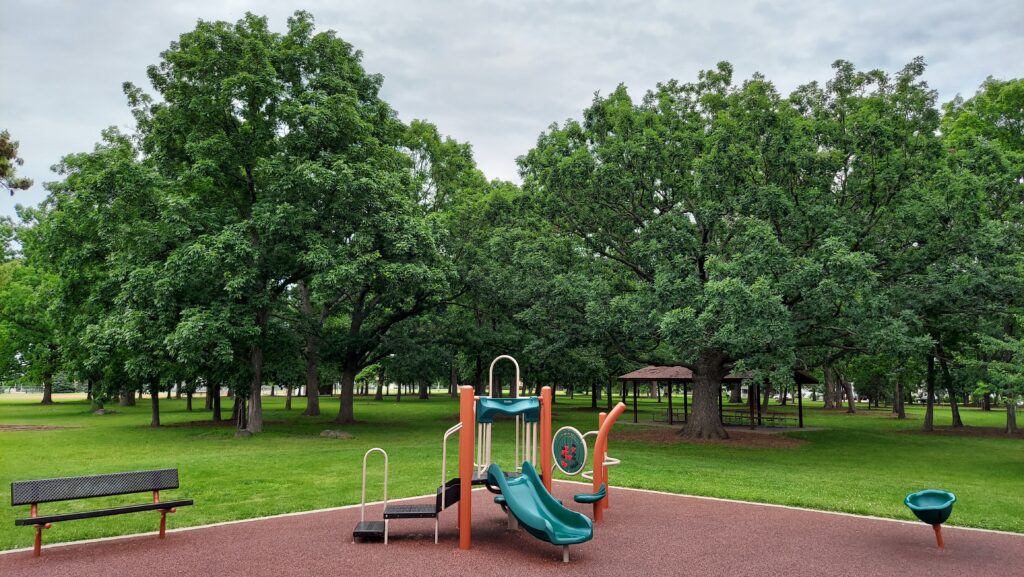 Cities, villages, towns, counties, tribes and 501(c)(3) nonprofit organizations in or conducting urban forestry projects in Wisconsin can now apply for a regular or startup 2026 Wisconsin Department of Natural Resources (DNR) Urban Forestry grant. The total 2026 available funding is $559,680, with a possible release of $139,920 of catastrophic storm reserve to fund a second round in March 2026. Continue reading “2026 DNR Urban Forestry Grant Application Now Open”
Cities, villages, towns, counties, tribes and 501(c)(3) nonprofit organizations in or conducting urban forestry projects in Wisconsin can now apply for a regular or startup 2026 Wisconsin Department of Natural Resources (DNR) Urban Forestry grant. The total 2026 available funding is $559,680, with a possible release of $139,920 of catastrophic storm reserve to fund a second round in March 2026. Continue reading “2026 DNR Urban Forestry Grant Application Now Open”
Urban wood
DNR Urban Forestry Council Welcomes New Members
By Jenn Janness, Urban Forestry Council Liaison, jennipher.janness@wisconsin.gov or 715-815-7173
The Wisconsin Department of Natural Resources (DNR)’s Division of Forestry recently welcomed six new members to the Wisconsin Urban Forestry Council and said farewell to three members who contributed much to the council. In addition, four council members renewed their commitment for another three-year term. Linda Cadotte was also confirmed as the chair and will serve for two years.
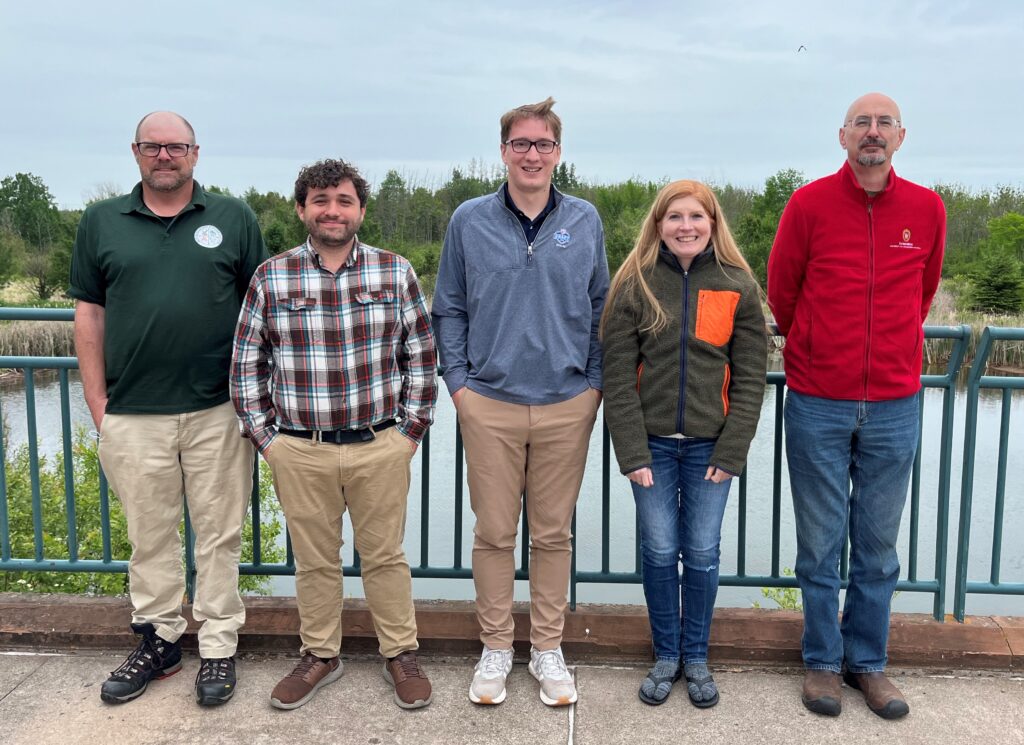
New council members left to right: Greg Blick, Mitch Lannan, Evan Miller, Kristi Sherfinski and Allen Pyle (not pictured, Jeff Kluslow)
Continue reading “DNR Urban Forestry Council Welcomes New Members”
Collaborative Reforestation – Sheboygan Area School District
By Tony Fessler, Co-Coordinator – Restoration Of Our Trees Sheboygan, www.sheboyganrotary.com or 920-946-6770.
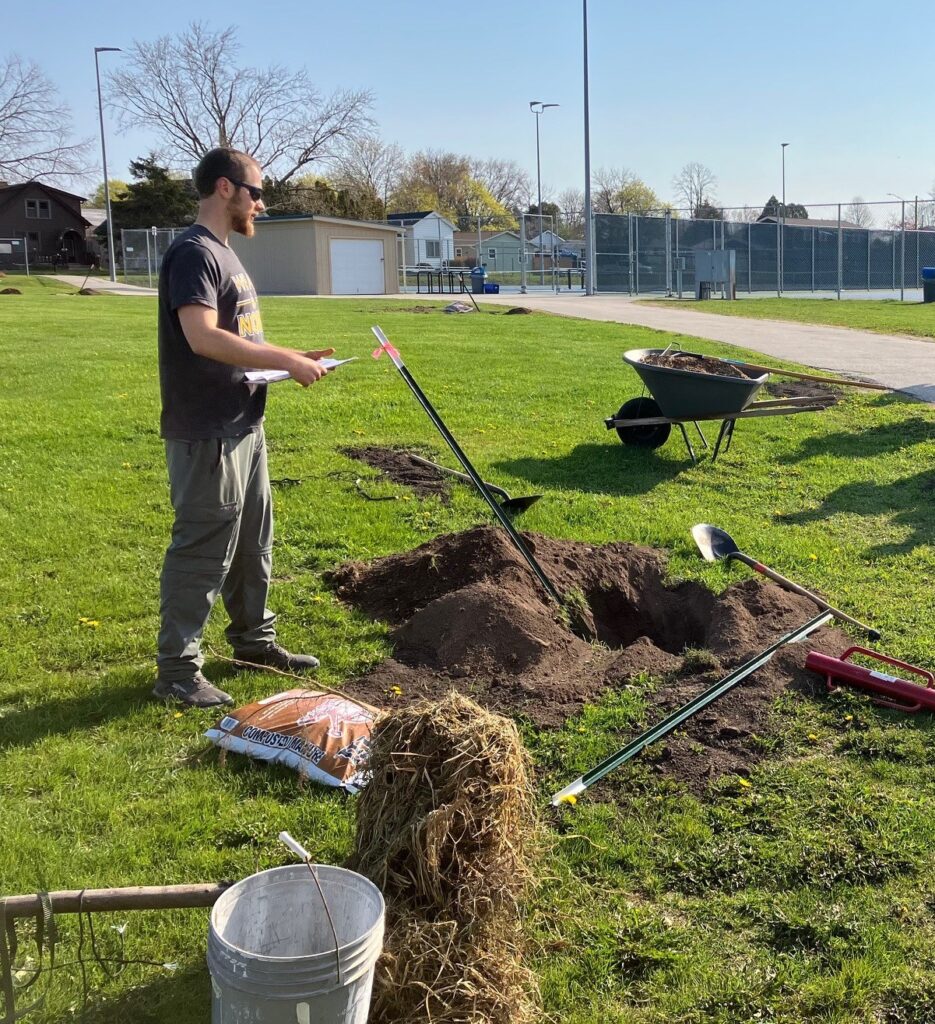
Photo Credit: Tony Fessler
A collaborative urban reforestation project involving the Sheboygan Area School District, the Sheboygan Rotary Club Restoration of our Trees Sheboygan (ROOTS) and the Lakeshore Natural Resource Partnership (LNRP) completed a second major milestone on May 10, 2025. This first-of-its-kind urban reforestation collaboration was initiated in 2024 through a matching $25,000 Wisconsin Department of Natural Resources (DNR) Urban Forestry Grant to ROOTS and LNRP. Continue reading “Collaborative Reforestation – Sheboygan Area School District”
Campers Reminded: Don’t Move Firewood
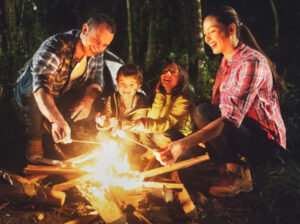
Going camping? It’s important to remember not to move firewood. Instead, buy it within 10 miles of where you will use it. This will help to prevent the spread of invasive pests. / Photo Credit: Istockphoto.com
By Wisconsin DNR
Camping season is about to enter full swing, and campfires are a Wisconsin summer staple.
That makes this a good time for the Wisconsin Department of Natural Resources (DNR) to remind the public of the importance of protecting Wisconsin’s forests and trees by not transporting firewood long distances.
Even after a tree has died, firewood can carry pests or diseases — on its surface or inside the log — which can attack or infect other trees. To help prevent the spread of invasive insects and diseases, always get your firewood near where you will use it.
April Offers Opportunities For Tree Lovers
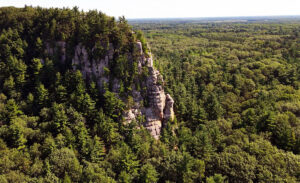
A beautiful view of Wisconsin forestland awaits visitors to Roche a Cri State Park in Adams County. / Photo Credit: Wisconsin DNR
By Art Kabelowsky, DNR Outreach and Communications
Arthur.Kabelowsky@wisconsin.gov or 608-335-0167
“Acts of creation are ordinarily reserved for gods and poets. To plant a pine, one need only own a shovel.”
Those were the words of Wisconsin’s most prominent conservation expert, Aldo Leopold, who authored the famous book, “A Sand County Almanac” among his many achievements.
This month, everyone in Wisconsin will have the chance to follow Leopold’s advice – even if in a small way, because many small efforts can add up to a prominent positive impact on Wisconsin’s trees and forests.
Continue reading “April Offers Opportunities For Tree Lovers”
Spring Brings Opportunities To Protect Oak Trees
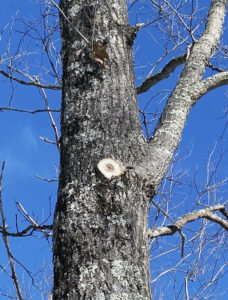
Pruning, cutting, or wounding oaks during April through July leaves them vulnerable to oak wilt. / Photo Credit: Paul Cigan, Wisconsin DNR
By Paul Cigan, DNR Forest Health Specialist
Paul.Cigan@wisconsin.gov or 715-416-4920
With warmer spring weather fast approaching, the Wisconsin Department of Natural Resources (DNR) recommends protecting oaks from the often-fatal disease, oak wilt, by refraining from pruning, cutting or injuring oak trees from April through July.
Oak wilt is a serious disease that kills trees in the red oak group (including pin oak, northern red oak and black oak) and weakens those in the white oak group (bur oak, swamp white oak, white oak and English oak).
Continue reading “Spring Brings Opportunities To Protect Oak Trees”
Lumber Milling At McFarland High School
By Peter Lindblad, HNG News Reporter, PLindblad@hngnews.com
Reprinted with the author’s permission.
The price of wood is soaring. To save a little money, the technology education department at McFarland High School has devised an ingenuous DIY cost-saving scheme.
Since 2019, Steve Pennekamp’s woodworking classes have been milling their own lumber. The village, in a partnership with the students, provides the logs, removed from projects around town. Continue reading “Lumber Milling At McFarland High School”
Treatment Of EAB Infestations In Yard Trees
By Abby Krause, DNR Urban Forestry Coordinator;
Abigail.Krause@wisconsin.gov or 608-556-5690
This summer’s detection of emerald ash borer (EAB) in Burnett County means our little metallic friend (or should I say foe?) is now known to be present in all 72 Wisconsin counties.
While EAB has been around for the better part of two decades in Wisconsin, many homeowners are still in the thick of dealing with the fallout of this invasive pest.
Continue reading “Treatment Of EAB Infestations In Yard Trees”
Wisconsin Expands Trillion Trees Pledge
By Carmen Hardin, DNR Applied Forestry Bureau Director;
Carmen.Hardin@wisconsin.gov
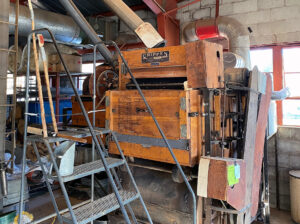
Existing seed cleaning equipment at Hayward State Nursery is scheduled for an update.
Landowners across the state have stepped up in a big way when it comes to planting trees.
At the end of 2023, more than 32 million trees had been planted and tallied as part of Wisconsin’s Trillion Trees Pledge. The program started in 2021 when Governor Tony Evers committed the state to planting 75 million trees and conserving 125,000 acres of forestland by 2030. Continue reading “Wisconsin Expands Trillion Trees Pledge”
Sign Up For Oak Wilt Vector Emergence Emails
By Kyoko Scanlon, Forest Pathologist, Fitchburg;
Kyoko.Scanlon@wisconsin.gov
With the recent warm-up and little snow on the ground in February, you may wonder if the insects responsible for transmitting oak wilt (oak wilt vectors) may emerge earlier this spring.
Though it is impossible to know precisely when they emerge, there is a tool that can be used to help you ease your anxiety a bit.
Continue reading “Sign Up For Oak Wilt Vector Emergence Emails”
